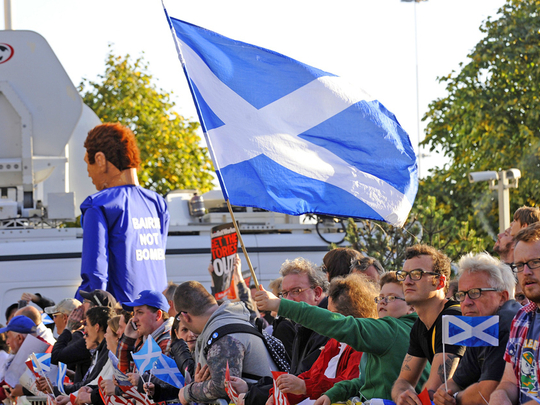
Thanks to the 1995 Hollywood epic historical drama Braveheart, directed by and starring Mel Gibson, many people have become familiar with the Scottish wars of independence viciously fought between the late 13th and early 14th centuries. Gibson plays the role of William Wallace, the legendary Scottish warrior who led his people in the first war of independence against King Edward I of England. In a little over two weeks the Scots will engage in yet another battle for independence, but their weapons this time round will be their ballot papers in yet another attempt to decide the future of their country: opt out, or remain a part of the United Kingdom and Northern Ireland.
With the forthcoming referendum on September 18, the Scottish people now look to write another chapter in their country’s long, but bloody, history. Scotland was once independent but this is a story of its historic past. Despite various challenges, this country of about 5.3 million is generally known to have maintained its independence, though at a very high price, for over eight-and-a-half centuries. It managed to remain independent from 843 till 1707, when the official unification with England took place. However, the present leader of Scotland, First Minister Alex Salmond, is no William Wallace, nor is British Prime Minister David Cameron King Edward I — particularly after three hundred years of an uneasy, but successful, union between Scotland and the rest of the United Kingdom.
It was in 1707 when Kingdom of Scotland joined the Kingdom of England, which included Wales, and the Kingdom of Great Britain was established. This state lasted almost a century before the Kingdom of Ireland joined in 1801 to form United Kingdom of Great Britain and Ireland. The following years saw unprecedented struggle movement for independence by the Irish population passionately driven by a powerful Republican national movement. The British were eventually forced to accept the splitting up of Ireland and recognised in 1922 the birth of the Irish Free State. This resulted in the slimming down of Britain to the officially declared state of the United Kingdom of Great Britain and Northern Ireland, UK as it is more commonly known. The independent Irish Republic as we know it today was established in 1949.
The complex evolution history of the states of the British Isles is full of drama and tragedies and has been evidently marked by historians and literary geniuses such as William Shakespeare and others. It has involved so many personal and political union and breakups across the Isles. The UK (and numerous sovereign European states) is the most recent state that has been established in different forms during different times.
The great British historian, Norman Davies, has counted sixteen different states over the past 2,000 years. In his brilliant book, Vanished Kingdoms: The History of Half-Forgotten Europe, Davies graphically illustrated how nations gradually disappear. “All the nations that have ever lived have left their footsteps in the sands,” he writes. “The traces fade with every tide, the echoes grow faint, the images are fractured, the human material is atomised and recycled. But if we know where to look, there is always a remnant, a reminder, an irreducible residue.”
But now and since the latter part of the twentieth century, the rise of Welsh and Scottish nationalism and the unstoppable progress of the Irish struggle for freedom — known in England as “The Troubles” — have all resulted in the establishment of devolved parliaments (or assemblies) for Scotland, Ireland and Wales. Each has its own local government, budget and its policies for development. Many believe these three devolved entities, apart from Wales, provide the corner stones for establishing fully-fledged future states. If Scotland goes down the independent route, this will strengthen the case for Northern Ireland to join, in part or as a whole, the Republic.
However, under the current circumstances, the call for independence in Scotland is very strong and fast gathering momentum as the pendulum has recently been tilting towards the YES campaign. This is despite the fact that a large business community believe that the future would be “better together” as the NO camp claims.
But it seems the Scots will go to the ballot boxes influenced by their passion rather their rational. If one goes down to the back streets of Dundee or Glasgow and meets ordinary Scots, you would still hear stories of glories about Scotland’s past heroes and how they were “betrayed by the English”. The strong sense of pride of their past has not died away, particularly among young universities students and the working class section of the Scottish society.
Therefore, “it is time for Scotland to take charge of its own destiny,” the Scottish government is telling the Scots. The 300-year-old Union is no longer fit for any purpose and that “an independent Scotland, with its oil wealth, would be one of the world’s richest countries.”
On referendum day itself, voters across Scotland will go to polling stations to answer yes or no question: “Should Scotland be an independent country?”
With almost 4.2 million Scots having already registered by August 1, the turnout is widely expected to reach nearly 85 per cent by referendum day.
— Mustapha Karkouti is a former president of the Foreign Press Association, London.










